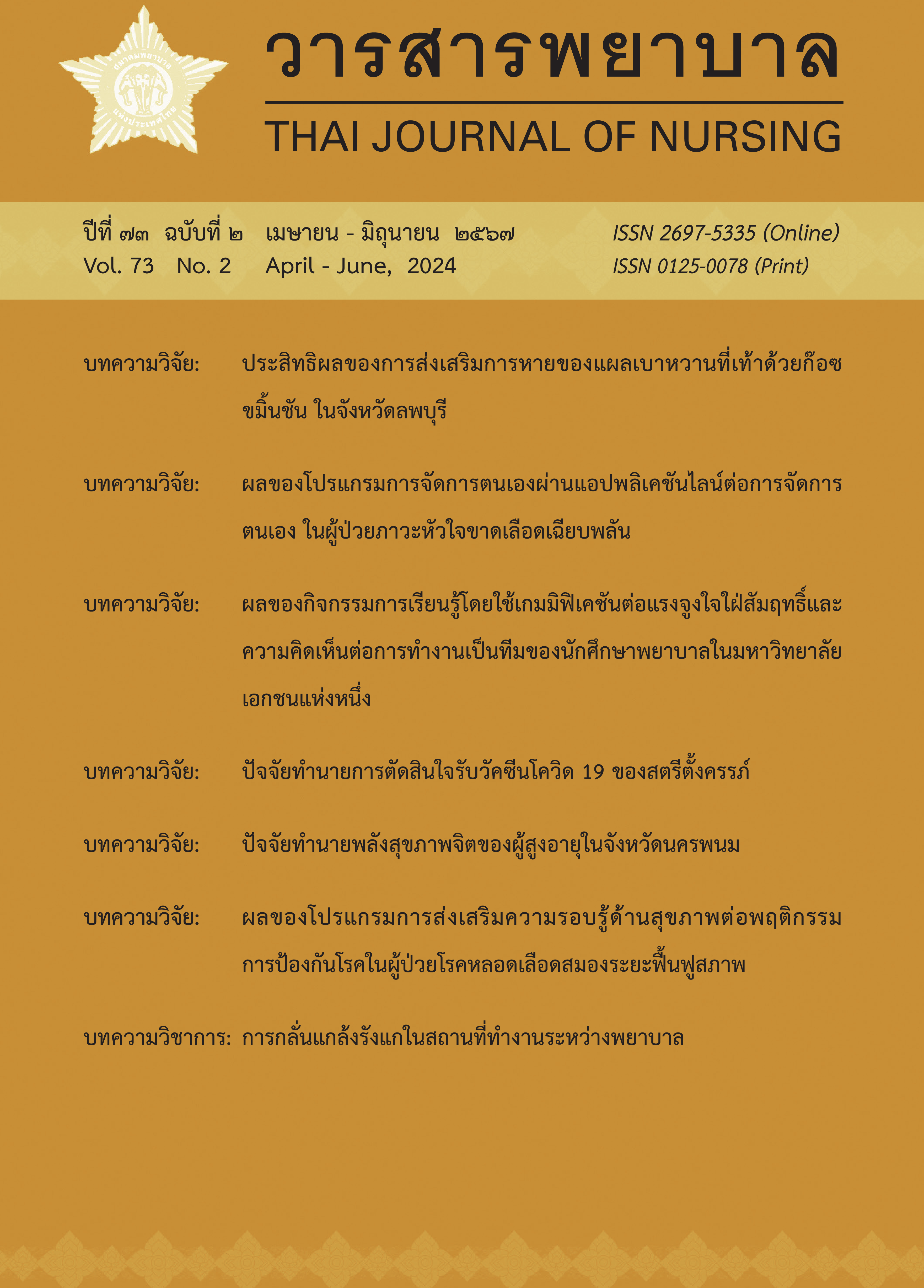The effect of self-management program through LINE application on self management in people with acute coronary syndrome
Main Article Content
Abstract
This quasi-experimental research aimed to study the effect of self-management programs through LINE application on self-management in patients with acute coronary syndrome (ACS). A total of 52 participants were patients with the first diagnosis of ACS, and admitted in a super tertiary care hospital in Bangkok. They were randomly assigned into an experimental group (n = 26) and a control group (n = 26). The experimental group was given a self-management program through the LINE application consisting of booklets about self-management in diet and physical activity and a manual LINE application, assessment, and video. Both groups received the usual care and a practice guide after acute coronary syndrome (ACS) booklets. The study duration was 8 weeks. Data were collected using questionnaires, demographic and medical records, and The Heart Health Self-efficacy and Self-management (HH-SESM). The data were analyzed by descriptive statistics, Chi-square test, and t-test. The results showed that after receiving the self-management program through the LINE application, the experimental group had higher average self-management scores than those before receiving the program (t = -11.305, p < .001). In addition, the experimental group had statistical significantly higher self-management average scores than those of the control group (t = -5.991, p < .001).
Article Details

This work is licensed under a Creative Commons Attribution-NonCommercial-NoDerivatives 4.0 International License.
References
กระทรวงสาธารณสุข กรมการแพทย์ สถาบันโรคทรวงอก. (2564). โครงการวิกฤตโรคหัวใจ ปลอดภัยทั่วไทย. https://www.ccit.go.th/saveheart/document/2564/project2564.pdf
จินตนา สีดี, วีนัส ลีฬหกุล, และทิพา ต่อสกุลแก้ว. (2561). ผลของโปรแกรมการปรับเปลี่ยนพฤติกรรมแบบผสมผสานต่อพฤติกรรมการจัดการตนเองและระดับภาวะสุขภาพหัวใจและหลอดเลือดของผู้ป่วยโรคหัวใจและหลอดเลือดที่โรงพยาบาลระดับตติยภูมิแห่งหนึ่งในจังหวัดเพชรบุรี. วารสารมหาวิทยาลัยคริสเตียน, 24(2), 216-228.
ณรงค์กร ชัยวงศ์, สุภาภรณ์ ด้วงแพง, และ เขมารดี มาสิงบุญ. (2557). ปัจจัยที่มีอิทธิพลต่อพฤติกรรมการจัดการตนเองของผู้ป่วยกล้ามเนื้อหัวใจตายเฉียบพลัน. วารสารไทยเภสัชศาสตร์และวิทยาการสุขภาพ, 9(3), 112-119.
สมาคมแพทย์มัณฑนากรหัวใจและหลอดเลือดแห่งประเทศไทย. (2563). แนวทางเวชปฏิบัติการดูแลรักษาผู้ป่วยภาวะหัวใจขาดเลือดเฉียบพลัน 2563. https://www.ciat.or.th/thaiacsguideline2020/
Eshah, N. F. (2019). Readiness for behavior change in patients living with ischemic heart disease. Journal of Nursing Research, 27(6), Article e57. https://doi.org/10.1097/jnr.0000000000000336
Guo, P., & Harris, R. (2016). The effectiveness and experience of self-management following acute coronary syndrome: A review of the literature. International Journal of Nursing Studies, 61, 29-51. https://doi.org/10.1016/j.ijnurstu.2016.05.008
Mares, M., Salamonson, Y., Maneze, D., Elmir, R., & Everett, B. (2022). Development and validation of a scale to measure self-efficacy and self-management in people with coronary heart disease. Journal of Cardiovascular Nursing, 37(4), Article e81-88.
https://doi.org/10.1097/JCN.0000000000000777
Radovanovic, D., Maurer, L., Bertel, O., Witassek, F., Urban, P., Stauffer, J.-C., Pedrazzini, G., & Erne, P. (2016). Treatment and outcomes of patients with recurrent myocardial infarction:
A prospective observational cohort study. Journal of Cardiology, 68(6), 498-503. https://doi.org/10.1016/j.jjcc.2015.11.013
Ryan, P., & Sawin, K. J. (2009). The individual and family self-management theory: Background and perspectives on context, process, and outcomes. Nursing Outlook, 57(4), 217-225. Article e6. https://doi.org/10.1016/j.outlook.2008.10.004
Wang, H., Zhao, T., Wei, X., Lu, H., & Lin, X. (2019). The prevalence of 30‐day readmission after acute myocardial infarction: A systematic review and meta‐analysis. Clinical Cardiology, 42(10), 889-898. https://doi.org/10.1002/clc.23238
Zakeri, M. A., Khoshnood, Z., Dehghan, M., & Abazari, F. (2020). The effect of the continuous care model on treatment adherence in patients with myocardial infarction: A randomised controlled trial.
Journal of Research in Nursing, 25(1), 54-65. https://doi.org/10.1177/1744987119890666
Zhang, Y., Yan, F., & Jiang, W. (2019). Relationship between self-management behaviors and health-related quality of life among Chinese patients with coronary heart disease: A cross-sectional study. Contemporary Nurse, 55(6), 554-564. https://doi.org/10.1080/10376178.2020.1731316


